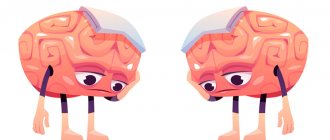Difficulty falling asleep is the most common type of sleep disorder. One of the forms of insomnia. This condition is successfully treated in our clinic.
Difficulty falling asleep is characterized by the presence of anxious or obsessive thoughts and is accompanied by a long period of falling asleep. When you still can’t fall asleep, irritability and fatigue appear. More often than not, you still manage to fall asleep, but you don’t stay asleep for long. The next day the person feels tired and overwhelmed. Today, every sixth person on the planet suffers from various types of sleep disorders.
Daily regime
It is recommended to go to bed at the same time.
This rule must be followed even if you have to wake up earlier than usual. The fact is that the body gets used to a certain circadian rhythm, so forcing yourself to go to bed earlier does not make sense - in most cases you will toss and turn in bed without sleep. Therefore, to get enough sleep, go to bed at your usual time. If insomnia does not go away, be sure to consult a specialist for further recommendations and selection of medications. Products for normalizing sleep can be purchased at Stolichki pharmacies.
Causes of difficulty falling asleep
Alcohol poisoning, drug addiction, alcoholism are the second reason for difficulty going to bed. In such a situation, disturbances begin with physiology. The body constantly receives a psychoactive substance that is addictive. The absence of a drug or alcohol does not allow a person to feel comfortable without a new dose. Drug addiction and alcoholism are severe psychopathologies that require complex treatment under the supervision of a clinical physician.
Self-medication for difficulty falling asleep
Sedatives, sleeping pills and drops are often the cause of poor sleep. Thanks to active advertising in the media, people take some medications without permission. Today, every tenth Russian takes sedatives and sleeping pills independently, without consulting a doctor. As a result, addiction develops, which is difficult to get rid of and cure. But still, it is possible. First, the person goes to a hospital, where the body is detoxified and the chemicals that caused the addiction are removed. After this, medications are prescribed to facilitate the withdrawal process. Then the disease that caused the excessive use is treated and psychotherapy and correction are carried out. This is necessary to return a person to normal mental and physical well-being.
If you have difficulty falling asleep
Many people themselves make it difficult to fall asleep by eating foods that stimulate the nervous system before bed.
If sleeping pills relax, then biostimulants and antidepressants excite. For this reason, they should not be consumed in the evening and, especially, before bedtime. Otherwise, you will have difficulty falling asleep and, at best, your sleep will be restless. Foods that stimulate brain activity include:
- coffee Tea;
- cocoa, chocolate;
- spicy food and drinks.
All these products can be consumed only in the morning or at lunch. And for people who cannot sleep at night for a long time, it is better to exclude them from the diet altogether.
If nothing else helps
If you still can’t fall asleep, start special exercises and techniques. The very effort to fall asleep at any cost can cause a surge of nervous energy that interferes with sleep. This means we need to try to “flip the switch” and bring the mind and body into a calm mode.
How to fall asleep in 10 seconds
This technique is taken from the book “Relax and Win: Championship Performance.” It says that the US Navy school has developed a special program that helps you fall asleep faster than in 2 minutes. It took the military personnel 6 weeks of practice for the technique to work, after which they could sleep even while sitting. The method described below takes 120 seconds, but it is the last 10 seconds that are most effective in inducing sleep.
- Go to bed.
- Relax your entire face, including your mouth muscles.
- Lower your shoulders to release tension and place your arms along your body.
- Exhale, relaxing your chest.
- Relax your legs, thighs and calves.
- Clear your mind for 10 seconds by imagining a relaxing scene (for example, the sun rising or setting, the sound of trees in the forest, the breeze on the sea, or the sleeping face of a loved one - each is different).
- Repeat the phrase “don’t think” to yourself for 10 seconds.
- During the last 10 seconds you should fall asleep!
Follow the advice of a somnologist and insomnia will go away
How to fall asleep in 1 minute
This method is called "4-7-8" and is a breathing practice based on the combination of the power of meditation and visualization. Each time the method works better and more efficiently. But, if you are asthmatic or have problems with the bronchi, consult your doctor. The 4-7-8 method may not work for you.
First, learn to count seconds correctly. It's best to practice while a walker or stopwatch ticks, trying to get into a rhythm. Then count out loud, first 15, then 20-30 seconds, repeating the exercise 2-3 times and checking your result each time. Next, bring the count to 1 minute to yourself. Practice the rhythm of counting seconds to perfection. Now you can move on to the technique itself.
- Go to bed.
- Place the tip of your tongue on your upper palate, just behind your two front teeth. Keep your tongue there the entire time, slightly pursing your lips if that’s more comfortable for you.
- Part your lips slightly and make a whistling sound, exhaling completely through your mouth.
- Purse your lips. Inhale quietly and without straining through your nose, counting 4 seconds to yourself.
- Hold your breath for 7 seconds.
- Exhale (with a whistle) for a count of 8.
- Don't worry about getting the count right. Try counting almost mindlessly. Repeat the entire exercise at least 4 times. Unless, of course, you fall asleep first.
If counting is too stimulating for your brain, try using your imagination. Scientists at Oxford University have proven that people who practiced “imaginative distraction” fell asleep quite quickly.
Instead of counting sheep, try to imagine a serene environment in detail. For example, a waterfall, echo sounds, the sound of water, the smell of wet moss. The main thing is that this image fits comfortably in your brain and does not allow any rubbish into it - thoughts, worries, calculations, plans.
Sleep and its standards
Sleep is a very important physiological process. After all, it is in their sleep that children grow. This can be explained by the fact that during sleep the body produces growth hormone - somatotropin. Its production peaks from about midnight to 3-4 am. Therefore, it is important for proper development and growth to adhere to a daily routine, which will benefit not only the child, but also rest for the parents. However, the older he gets, the less time he needs to sleep. A child aged 2 to 4 years needs 16 hours of sleep, a child aged 5 years needs 13 hours, a child aged 6-7 years needs about 12 hours, and teenagers need 9 hours of sleep.
There are a huge number of ways to quickly put your child to sleep. An important role in choosing a method suitable for your baby is played by his age.
There are a huge number of ways to quickly put your child to sleep.
First, let's look at several effective ways to put a baby to sleep.
How to put a baby to sleep
If you have ruled out the possibility that the baby is hungry, has wet diapers, or is in pain, then we proceed to selecting the best means for falling asleep:
- As already mentioned, an important aspect is maintaining a daily routine . It is necessary to prepare for bed, if possible, at the same time.
- During the first month, you should introduce your baby to the times of day - day and night. During the day it should be light in your apartment, you should not communicate in a whisper, but, as you understand, you should not shout either. Some pleasant music or a film can be an accompanying sound background. At night, on the contrary, darkness and silence prevail.
- If there is a need to feed or change a diaper, then it is better to do this using a dim night light so as not to interrupt sleep.
- Excessive nervous excitement (active games, loud noises, lots of attention from grandparents) a few hours before bedtime will also not work in your favor. The same will apply to older children.
- Equally important is an adequate feeding rhythm. Every adult knows that sleep after eating is especially pleasant. According to WHO, a child during the first 3-4 weeks of life should be fed on demand. However, starting from the end of the first month of life, you must get used to the feeding schedule and the interval between them. Thus, in the second month of life, infants need to be fed 6 times a day, maintaining a 3.5 hour interval between feedings. Night feedings are not counted. And starting from 6 months, you can switch to 5 feedings a day, observing 4-hour intervals. If your baby does not wake up on his own at night to eat, this does not mean that he needs to be woken up and forcibly given breastfeeding or formula. This means that your baby does not feel hungry, otherwise he will let you know about it.
There are many methods for putting a child to sleep, the main thing is to choose the right one.
Bedtime methods
So, below are several methods that will help you put your baby to sleep:
- White noise . As you understand, while the baby was inside his mother, he was never completely silent. He always heard the beat of her heart, the sound of her voice, all the sounds happening around: the voices of others, the sound of rain, wind, water, music. Therefore, all these quiet, measured sounds will give him a feeling of calm, safety and comfort.
- Swaddling . Babies in the first months of life are characterized by spontaneous motor activity in the form of startles, which can cause problems with sleep. To prevent your own hands from being frightened by spontaneous movements and not woken up, you can use regular or special diapers for changing. This will ensure more restful and longer sleep.
- Motion sickness . This is also one of the things that simulates intrauterine life, which is so familiar to a child. While it was in your stomach, all your movements, travel in transport, and playing sports were a kind of motion sickness, which allowed you to sleep sweetly and enjoy life. Therefore, after birth, taking him in your arms and carrying him for up to half an hour, you will create that very favorable environment for sleep. You can also rock your baby in a playpen, stroller or rocking chair. If you are willing to spend a little money, there are special rocking centers that make life easier for parents. But this is not always the easiest way to help your baby sleep. For mom this is quite hard physical work. Therefore, if you want to put your baby to sleep without motion sickness, in order to make your life easier, it is better to teach him to fall asleep without them.
- Diaper with mom's scent. For the baby, mother, her smell and voice are a feeling of safety and comfort. Therefore, if you sleep on a diaper, and then the baby is covered with it, or you just put it next to him, this will help him fall asleep.
- Ritual . Come up with something for yourself and your little one to do before bed (no more than 30 minutes). It should be something relaxing and calming. For example, turn on quiet, calm music so that the child quickly falls asleep. Sing him lullabies or use gentle strokes. In a few days you will understand for yourself what is right for you and your baby.
- Sling . In other words, this is a fabric that allows you to fix the baby to the mother’s body and ensure maximum contact. At this time, the mother can go about her business with her hands free, and the baby can sleep carefree.
- Using a pacifier . The sucking reflex appears in the womb when the baby begins to suck his thumb. It's no secret that this helps your child fall asleep.
- Deception . Place your baby next to you, hug him, close your eyes and try to breathe slowly and steadily. By pretending to be asleep, you will signal that it is time for him to rest too.
- Be observant . Just watch the baby, he will always give a signal that he is ready to sleep. Children begin to yawn, rub their faces and eyes with their hands, become less active and lose interest in surrounding things and events. Catch the right moment and go to bed.
Effective ways to treat difficulty falling asleep
Before prescribing treatment, specialists conduct a comprehensive diagnosis. This makes it possible to find out the true cause of the disease and completely cure the disease.
If the neurologist and therapist have not found the cause of the sleep disorder, then a diagnosis is carried out using polysomnography - sleep monitoring in a hospital under the supervision of a somnologist.
After diagnosis and diagnosis, treatment and correction are prescribed. For this purpose, medications with a sedative and hypnotic effect are most often used. The maximum period for taking them is up to two weeks. If at the end of this period sleep is not restored, additional diagnostics are carried out, after which other complex medications are prescribed.
When the cause of difficulty falling asleep is anxiety or increased irritability, it is very important to use psychotherapy methods. As a result, a person works through issues that cause psychological discomfort and the general state of mind is corrected. For this purpose, they use: auto-training, hypnosis, body therapy, aromatherapy, psychodrama, positive psychotherapy, music therapy, aromatherapy and other methods.
Get rid of difficulties falling asleep in the clinic
The Transfiguration clinic has everything you need to restore normal sleep: specialists, equipment, laboratories, medications. Thanks to a wide range of techniques used in the clinic, you can regain healthy sleep and get rid of difficulties falling asleep.
Treatment can be carried out in a hospital or on an outpatient basis, but under the constant supervision of attentive doctors. Come, call, seek advice: psychologists, psychotherapists, somnologists, psychiatrists and neurologists at the Preobrazhenie clinic will help you get back good sleep and joy in life.
What prevents you from falling asleep
- Extraneous sounds. The stomping of neighbors, the TV playing in the next room, car horns outside the window, dog barking - these are just a few sources of noise that clearly do not contribute to falling asleep quickly. The fact is that in this phase of sleep the body responds sensitively to external stimuli, and any sharp or loud sound can wake you from the state of half-asleep that precedes falling asleep.
- "Heavy" thoughts. Troubles at work, worries about children, problems in the family - all these worries pop up at the most inopportune time, late in the evening. Of course, they interfere with sleep, since during this period of the day the brain should relax, clear itself of life’s worries, and disturbing thoughts, on the contrary, “excite” it and force it to look for a way out of the current situation.
- Bright light. It's not just about street lights and advertising signs that shine through windows. No less harmful are the screens of laptops and smartphones, which we use to scroll through our VKontakte or Instagram feeds before going to bed - this habit should be abandoned. In addition, late in the evening it is better to turn off chandeliers and overhead lighting and leave only the warm, dim light of night lamps.
- Physical exercise. Do you want to quickly fall asleep and stay asleep? Avoid going to the gym and doing active sports in the evenings. The optimal replacement would be a light jog, swimming or (best of all) a simple walk in the fresh air.
- Alcohol and high-calorie foods. Alcoholic drinks “invigorate” the nervous system, and heavy protein foods activate the body’s strength to digest it. On the other hand, after a hearty feast and large doses of alcohol, a person can quickly fall asleep, but this still cannot be called complete sleep.
- Unhealthy microclimate. If the room is not ventilated, this affects both the duration of falling asleep and the quality of sleep. Stale air, stuffiness, and high humidity affect physical and mental health, and in order to fall asleep easily, you need to relax your body and put your emotional background in order.
Recommendations for relaxation before bed
To get the most complete rest, you need to follow some rules:
- Sleepwear should be comfortable.
- Bed linen should be made from natural fabrics.
- It is advisable that the mattress and pillow be orthopedic.
- It is better to take a warm bath before going to bed. It is worth adding essential oils and medicinal herbs to the water.
- The attitude should be positive.
- The space reserved for sleeping should not be used for watching TV or other activities.
If a person takes a long time to fall asleep, he is concerned about what helps him fall asleep. To do this, there are rules for preparing for bed, as well as various techniques that can relax the body.
Autotraining
This is an effective exercise from the series on how to fall asleep in 5 minutes. It is not necessary to complete it; you can stop as soon as you feel sufficiently sleepy. True, it doesn’t work the first time because it requires certain skills and training.
To perform this, you need to lie in bed and cover your entire body with a blanket except your head. Next, we straighten our legs and arms and mentally transport ourselves to a warm beach with snow-white sand and a warm turquoise sea. A light, warm and pleasant breeze caresses your body. You feel how with light warm gusts it first blows on your feet, slowly moving to your lower legs, then to your thighs and finally covers your whole body. You feel a slight tickling on the most convex places of your body. You feel good and pleased and all this repeats.









